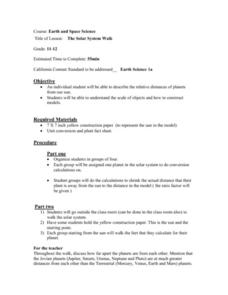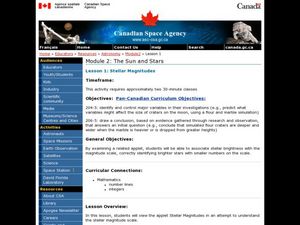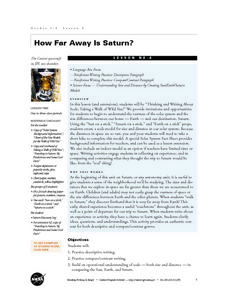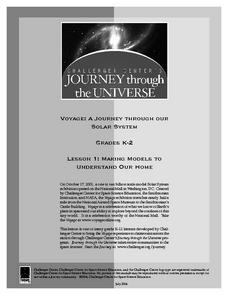Curated OER
Star Circles
In this star circles worksheet, students solve six problems given a diagram of a time-exposure photograph of the stars. Students determine the scale of the image, the location of the North Celestial Pole, they identify Polaris and they...
Curated OER
Is There Ice on Mercury?
In this ice on Mercury worksheet, students read about the data collected from the NASA Messenger and the Arecibo Radio Telescope indicating the possibility of ice on Mercury. Students solve 6 problems including finding the scale of the...
Curated OER
Understanding Air Pressure
Fifth graders complete experiments with air to understand that air takes up space, has mass, and that air pressure can be changed. In this air pressure lesson, 5th graders test the air pressure by using balloons, syringes, and water to...
Curated OER
once and future MOON
Beyond the phases of the moon, this comprehensive lesson plan covers geologic history and geology. Amateur astronauts examine photos of the lunar landscape, experiment with the creation of craters, and delve into information about the...
Curated OER
Bringing the Solar System Down to Earth
Students develop a scaled down model of the solar system. In small groups, they calculate the scaled-down diameters of the planets and the sun, the scaled-down distance of the planets from the sun, complete two charts, and create a...
Curated OER
an Explorative Journey Through the Solar System
Learners, in groups, research a planet from our solar system. They create Styrofoam models of the planets and place the planets on a correct distance scale from the sun.
Curated OER
Solar System Lesson Plans
Solar system lesson plans provide teachers with a multitude of ways to interest even the most reluctant learners.
Curated OER
We Are Lunar tics!
Second graders, working in cooperative groups, will create a multimedia presentation about the Earth's moon. Their research must be presented through three or more methods. (i.e. charts; graphs; oral reports; multi-media; dramatic role...
Curated OER
Tracking Satellites Using Latitude and Longitude
Students, viewing an Internet site, plot the path of several satellites using latitude and longitude over the course of an hour. They learn the four basic types of satellites and their purpose.
Curated OER
Is There Liquid Water on Mars?
Learners assess whether there is liquid water on Mars by analyzing images and data. In this planetary lesson students analyze temperature and pressure graphs and hypothesize about how water could have flowed on Mars.
Curated OER
The Solar System Walk
A unique lesson on the solar system, and some of the mathematics associated with it, is here for your high schoolers. Pupils are put into groups of four, and each group is assigned one of the planets from our solar system. They must...
Curated OER
Exploring Mars
Learners, working in small groups construct scale models of the planets and solar system. They examine images of Mars and discuss what might have caused the features. They record facts about their planetary research in their journals and...
Curated OER
Charting The Progress of New Horizons
Learners explore the long distances and timescales involved in space travel. They track the progress of the New Horizons spacecraft and access the New Horizons website to discover the distance of the spacecraft from the Sun, and then...
Curated OER
Gravity
Sixth graders explore the characteristics of gravity. They discuss gravity on Earth and then use cereal boxes to research and compare the weight of objects on Earth to the weight of those objects on other planets.
Curated OER
A Model of the Sun's interior
Young scholars create a three-dimensional model of the sun. For this solar system lesson, students design a scale model of the sun using plasticine.
Curated OER
NASA's Mars gamble pays off
Students read an article about NASA and Mars and complete short answer questions about the article. In this Mars lesson plan, students also create a scale model of the solar system.
Curated OER
Stellar Magnitudes
Learners analyze the stellar magnitude scale. In this stellar magnitude lesson, students examine the stellar magnitude scale. Learners predict the Sun's magnitude from various planets.
Curated OER
How Far Away Is Saturn?
Students work together to create a scale model of the solar system. They write a descriptive paper and a paper comparing and contrasting the Earth to Saturn. They discuss their writings with the class.
Curated OER
Spaced Out
Young scholars explore the transit of Venus and the information that this minieclipse provides about the distance between the Earth and the sun. They create their own astronomical units.
Space Awareness
History of the Universe
Your pupils may believe that you and their parents are the oldest things in the universe, but surprise! There are elements of the universe that are even older. Elementary scientists create a class timeline to demonstrate the...
Curated OER
Making Models To Understand Our Home
Students investigate the concept of a model and how it is used to represent something that is real. They recognize how the model can be applied to other types of concepts like the solar system. Students create a scale drawing of a house...
Curated OER
Catch a Wave. . .
Part of a larger online space science website, this page has a brief explanation of electromagnetic radiation and a chart of wavelengths as compared to common objects. There are four questions to answer about the information. This can be...
Curated OER
What Is El Niño?
Students access information at remote sites using telecommunications, identify impacts by reviewing past El Ni??o events, make and use scale drawings, maps, and maps symbols to find locations and describe relationships.
Curated OER
The Mysterious Hexagon on Saturn!
In this Saturn activity, students use a photograph of a hexagon feature on Saturn to solve three problems. These include finding the time it takes for the jet stream to complete one circuit around the hexagon, to find the size of the...























